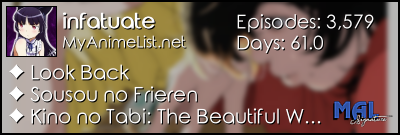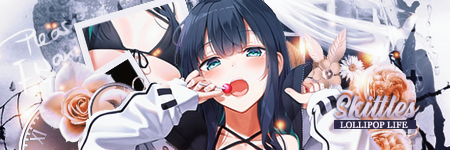New
Jul 17, 2019 11:24 AM
#1
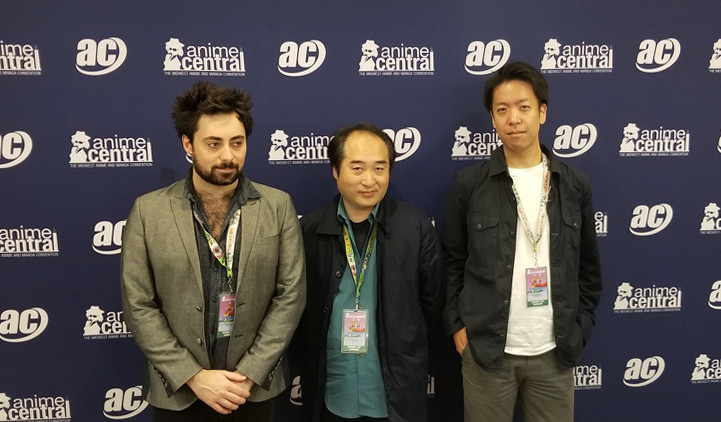 From left to right: Kevin Penkin, Takao Abo, Hiromitsu Iijima A year after the completion of its critically-acclaimed anime adaptation of Made in Abyss, Kinema Citrus released a new project in early 2019: Tate no Yuusha no Nariagari (The Rising of the Shield Hero). While not as highly-rated as Made in Abyss, Tate no Yuusha no Nariagari was the most-watched show of Winter 2019 on MyAnimeList, ranking in the top 200 most popular anime of all time despite the recent saturation of isekai ("other world") shows. At ACEN 2019, MyAnimeList had the opportunity to participate in a media conference with Takao Abo, Hiromitsu Iijima, and Kevin Penkin; the director, music producer, and composer for Tate no Yuusha no Nariagari, respectively. [At this point, only Mr. Penkin and Iijima-san were present.] Mr. Penkin—compared to some of the other work you've done, how was your experience composing for Shield Hero? Penkin: Shield Hero is quite different from the other material that I've done with Kinema Citrus, namely Made in Abyss. And the main difference definitely came down to the fact that Made in Abyss has a very, very different center of approach to worldbuilding than Tate no Yuusha. It (Tate no Yuusha) is an isekai based loosely around the idea of a JRPG or some sort of roleplaying game... and the idea of being able to write music like you're writing for a big JRPG title was quite appealing. Comparing that to Made in Abyss, which was more of an experimental approach, being able to go back to what I was being influenced by, what I wanted to write like as a teenager—it was actually really, really fun. 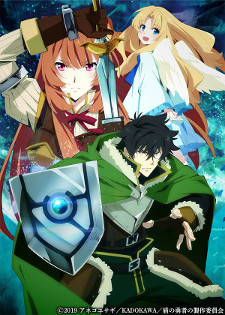 How was it decided that Kevin Penkin would be brought on to compose music for this series? How was it decided that Kevin Penkin would be brought on to compose music for this series?Iijima: Well, we've had past success working with Kevin. His music grabs the listener—and frankly, he's a musical genius, so it was an obvious choice. (laughs) Penkin: Yeah, going off the back of Made in Abyss's success... I've actually worked with Kinema Citrus quite a few times now, so there's already a track record there. So yeah, it was a natural progression, and it's still going. Mr. Penkin, were you expecting the level of popularity you got after Made in Abyss? Penkin: Absolutely not. (laughs) It was great. My Twitter followers went through the roof, and I felt really good about it. You know when you finish a job or when you see a job you were working on, you're like "wow, that's really cool"? That's obviously something where you try and keep the momentum, but once you finish the job, it's out of your control. I reckon there are probably a few variables that led to Abyss becoming what it was—one was the really awesome story, the manga. But maybe the timing of when it came out, things like that... and more importantly, what wasn't around at the time, in terms of that style. It must've been considered a bit of a breath of fresh air, which is really, really nice. I think it... worked out okay. (laughs) Is there any specific track from the OST that you're most happy with? Iijima: I forget the name... (sings, trying to remember) Penkin: Ah, there's a track called Kansas, which features two guitars and two cellos. And that's sort of Iijima's favorite track. The one I like is probably the Church of Three Heroes, the final boss track, or battle track, that we have on the currently released soundtrack. And that's just this massive... (gestures broadly) It had church organs and rock orchestras. Speaking of tracks, how do the tracks get names? Some of them seem very closely tied to the scenes they appear in, but others are a bit... interesting. Penkin: Yeah, I'm working on that. So right now, in the current projects I'm working on, I've actually started using the tone of the track as an aesthetic before I've actually completed it. The idea of writing a track around a named concept has been quite an interesting thing to explore. With Shield Hero, it was not the case. It was like, okay, I know this track is music one, or music 25, or music 37, so now I need to fold that into something that's related to the story. And watching the anime kind of helps with that, because you can see how the music is used in context. Moving forward... Yeah, I think... Well, for example, Kansas—that's a reference to "You're not in Kansas anymore, Dorothy." That's it. When the music's playing, he's just moved to Melromarc, he's just been transported there. And I thought that was kind of a touching... not touching... that's a bit much, that's a stretch. (laughs) But it was quite appropriate. So those sorts of titles are made like that, and some of them are literally just... you know, Church of Three Heroes. It's a literal reference to the story. Was there ever a piece of music that you were unhappy with after the fact, that you needed to rework or go back to? Penkin: That's definitely an issue with timeline. So, in the case of Shield Hero... we had quite a long production period. I was working on the soundtrack from July of 2017 until October or November of 2018, and that's a pretty long time for a music schedule. Normally, it's done within a maximum of six months. So we did have a little bit of time to let the soundtrack breathe. And then, if we wanted to go back and rework some things, we could. A lot of the reworking, a lot of the things that we tried to improve had to do with the production quality—making sure that not just the mixing process, but maybe the different recording processes for certain instruments, extra instruments, were good. We had a bit of a policy on Shield Hero that we would try to get a live instrument in every single track. Obviously, if there's this really, really big track, you have to pick your battles, but making sure that every track had at least something live in it was a little goal of ours. 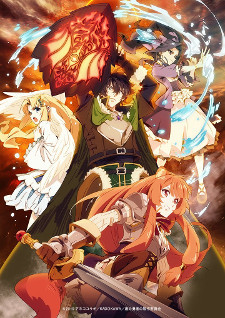 You've worked with a number of different styles. Do you ever find yourself gravitating towards a central theme or way of composing across your different works? You've worked with a number of different styles. Do you ever find yourself gravitating towards a central theme or way of composing across your different works?Penkin: Other people hear it. (laughs) I have come to notice how every soundtrack is related to each other. The sort of throughline that I personally see, from soundtrack to soundtrack, is actually the sort of equation I use to derive styles from the show. Let me give two examples to show what I see as similarities. Made in Abyss, for example, features a small number of characters in a very, very big space. So the idea of recording a small number of musicians in a big space makes a lot of sonic sense to me. That's almost like a mathematical parameter that I would then try and stem down into a musical approach, style, or some sort of textural node. Shield Hero, as I mentioned before, has JRPG influences. There's a lot of spirituality, or quasi-spirituality, in Shield Hero... so making references to spiritual music of the classical era just sort of makes sense in terms of trying to essentially physically represent, in the music, what's happening in terms of setting, character design, or the story. So that's the throughline that I see. The actual writing of it... I use a lot of minor chords, so... (laughs) Maybe? You mentioned that you wanted to have a live instrument in every track. Was there a particular sort of instrument that you were drawn to? Iijima: I think the acoustic guitar. The sound is amazing, and it's not something that can be fully captured with synthesizers. So it's important that it's the actual instrument. Penkin: Yeah, live acoustic guitar. There were different vocalists for one of the tracks in the dub and the sub. What was the process behind deciding to do that, as well as actually executing it? Penkin: So yeah, Falling Through Skylight... through Skylight... sorry, I only had one coffee this morning. Falling Through Starlight is the track you're referring to. I've never done that before. Normally, it's just the one singer and that's it. The interesting thing with Shield Hero was that they made a very conscious effort to try and make the show more international. So the idea of being able to essentially specialize depending on region, having different vocalists—and Amelia Jones and Asami Seto are the two vocalists, Asami Seto also being the Japanese voice actor for Raphtalia—they have, inherently, completely different voices. It's almost like two completely different shades in the same drawing. That was an interesting experiment, because I took care of the English recording, and Iijima took care of the Japanese recording in Japan. So, yeah. That was a thing. How did you get started at Kinema Citrus in the first place? Iijima: Oh man, I don't remember... Penkin: I remember. (laughs) So I come from games, and I started writing game music in 2011, I think? And that was actually with Nobuo Uematsu, back in the day, on a few games that came out in Japan. One of them was actually a game called Norn9, which ended up becoming an anime. And it just so happened that Kinema Citrus, who I was working with at the time on a Kickstarter anime called Under The Dog, were also working on an anime adaptation of Norn9, which I had just happened to have written for, as a game, a couple years prior to that. So... I have no idea what black magic was responsible for that, but I'm glad it happened. Because doing Under the Dog and Norn9, these first two projects... they were contained enough that I could sort of cut my teeth a little bit and kind of get used to the different intricacies in writing for anime versus for games, the only thing I knew at the time. That paved the way pretty well for going into Made in Abyss, and for moving forward from there. Could you tell us a bit more about the exact process of creating these individual songs, adapted to different scenes? Are you given a set of criteria, such as "oh, we want this sort of emotion evoked," or the details of the scene beforehand? Iijima: Yes, so for Shield Hero... as the sound director, I was given an initial formal request to make sixteen tracks. So I separated the songs into different genres, such as ordinary songs, miscellaneous songs, character songs, and I put down descriptions that explained in more detail what they were all supposed to be. Penkin: Yeah, you basically get a big Excel file that says "oh, we need tracks 1-16 and track 1-5 will be main themes, tracks 6-10 are going to be ordinary songs..." So it's split into different genres, and they're given different descriptions. Based on the blueprint provided by these descriptions and reference images, etc., you then start writing the soundtrack Who is your favorite character from the show? Iijima: I think Fitoria, the queen of the Filolials. Penkin: Naofumi. 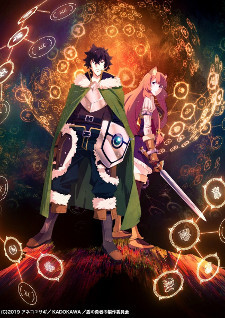 Are there any tracks you've worked on that you kind of regret? Tracks that are in there and you can't get rid—and they aren't terrible, but every time you hear them, you go "ah, why'd I do this"? Are there any tracks you've worked on that you kind of regret? Tracks that are in there and you can't get rid—and they aren't terrible, but every time you hear them, you go "ah, why'd I do this"?Penkin: I have a pretty bad relationship with control. I'm quite a control freak. And so, if there's something I hear that... seriously, things literally no one else would hear or ever care about... there's definitely that perfectionist approach to things, hopefully more on the healthy side of perfectionism. No matter how little or, for the lack of a better word, insignificant a song can be in the grand scheme of things... when you hear it, that little part of your brain just goes "it could've been different"! But some things that are really important to keep in mind when it comes to that are A. the project is massive, or B. the deadlines are tight, or C... actually no, those are the two big ones. Oh, or if you've run out of money! You kind of have to pick your battles, and I think trying to make peace with that is a slightly healthier approach because if you obsess about every single track to the point that you make yourself sick... it's not fun. What were the differences between the processes of working on Shield Hero and Made in Abyss? Penkin: With Abyss... actually, I'm going to give a contrasting example. So Made in Abyss... because I hadn't done anything like that, something that gave me the opportunity to be slightly more experimental, it was very cathartic to be able to put all the early influences, the stuff from my experimental music college days, into anime music. It almost felt like a return to form, where I could just write freely, and it ended up working really, really well. I mean, obviously, you target it to work that way... But Shield Hero, like I said, was completely mapped out already, and there's another project I'm working on right now that I can't name... but from a creative standpoint, it was a similar situation where we were able to suggest music that we thought would work really well for that project. The problem is that I now have the experience of doing both of those approaches, so having to essentially one-up myself in terms of doing crazy shit... Um, that's when I started going to the bathroom a little more, and going to bed in cold sweats. So they both had their challenges. Shield Hero had a rigid approach to writing the music, which was very comforting, and allows you to very clearly map things out in your head, like "I need to do this track, and it needs to sound like this, etc. etc." But if you're doing Abyss or the aforementioned secret project, where you get a blank canvas, that's both the most exciting and terrifying time of the process. Until you finish it... then it's great. So you mentioned how long the production process was for Shield Hero. Could you talk a bit about the access to the story material that you had throughout that process? Iijima: Yeah, of course. Shield Hero was originally a novel, and so I read it to get a handle on its main themes, as well as a solid idea of the things that would happen to Naofumi. Penkin: Iijima-san and I worked quite closely together to determine what the music should sound like. It was a very close and regular conversation that we had. [At this point, director Takao Abo joined the interview.] Abo-san—The show can be rather dark at times, but there are some amusing parts of the story that help lighten the mood a bit. What kind of choices were made to keep those parts distinct from the much more aggressive and angsty side of the show? Abo: In order to show the characters and develop them from the beginning... in episodes 1-4, we needed to show the conviction of the main characters, and so we made the decision to suppress those comedic elements so we could develop those main characters. After that, we made the decision to add some funnier, more comedic elements and insert them in key areas to lighten the tone. As we were completing the series, we returned to that darker and more serious tone. Basically it's a very serious work, and we emphasized that in the beginning and the end, but we added some comedic elements in the middle to lighten the tone, as you noticed. Could you tell us a bit about your initial impressions of the original work? Abo: Before I came into contact with the light novel, I actually received the manga first. I read them, and my initial impression was that yes, this is within the isekai genre, which is very popular in Japan. Normally, those isekai kind of worlds are comparatively light, and this particular work had a lot of rage, frustration, and really strong emotions within it. I thought that was something unique about The Rising of the Shield Hero, and I thought it might be a good fit for my style, and that's when I thought that yes, I really want to direct this. Was there a particular character that you were especially excited to portray, to have audiences see? Abo: So first of all, the protagonist—I was initially struck by the appeal of the protagonist Naofumi. Similarly, Raphtalia was also a very important character to me. But there's also a unique character called Mai who has an interesting impact on Naofumi, and I thought a lot about how to portray her, how her existence impacts the other characters, and how she would develop over the course of the story. I think those were the major characters for me. When you obtain a project, do you have a strict way you approach it, or do you typically proceed in a more freeform way, changing as the project goes on? Abo: Personally, when I do projects... after receiving the original work, I try to read and understand it as much as possible. I want to express the full nature of the work as completely as I can. But with some works, I deepen my understanding of it as I'm working, and so there are changes that I make as the project progresses. In the end, I really try to express or communicate the link between my own feelings and the protagonist's feelings and express that to the audience—as a complete work with a final message that I'm sending. Iijima: Indeed, the content of the final episode wasn't even decided until later in the project, so this is something that we were really thinking about on the music side—what would happen to Naofumi and how his feelings would evolve within the confines of the show. And so it wasn't until we talked to Abo-san and found out what was going to happen later in the series that we were finally able to realize that in musical form and communicate all that to Kevin. 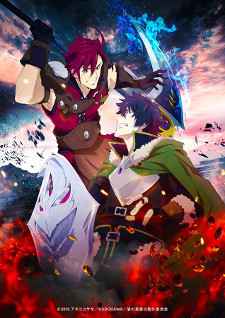 As anime has become more global, it's almost inevitable that any anime that comes out is going to get localized for the American or other foreign markets. When you're directing, do you take that into account? Or do you allow the localization teams to worry about that after the fact? As anime has become more global, it's almost inevitable that any anime that comes out is going to get localized for the American or other foreign markets. When you're directing, do you take that into account? Or do you allow the localization teams to worry about that after the fact?Abo: From the beginning of this project, we knew it was planned for global distribution, that people outside of Japan would be seeing it. I was aware of that and, as I said earlier, this is a very serious work. So if there was one change that was influenced by the knowledge that the show would be broadcast outside of Japan, it was probably the fact that the atmosphere in the show was made perhaps even more mature than it was in the original manga or novel. Do you have any particular moments or episodes that you are especially proud of? Abo: I personally drew the storyboards for this work, but one scene in particular I am very happy with is the scene in which Raphtalia releases Naofumi's heart. I really love that scene, and Kevin created a beautiful theme and melody for the heroine Raphtalia in it. When I look at how the music merges with the art, the color, the characters, and the design, it really turned out even better than I'd hoped. Looking back, that's a scene I'm particularly happy with. Shield Hero is the second time you've been the lead director, after Norn9. Can you tell us about the transition from animator to episode direction and storyboarding, and then leading a series? Any challenges associated with that? Abo: Yes, so... becoming a director took many years, and... when I was just doing the drawings, I always felt this sense of frustration. Like, if I was doing the backgrounds, I would do it like this, or if I were choosing the music, I would choose the music like this. And so I had this image that built up over the years, and when Kinema Citrus came to me and gave me the opportunity to direct Norn9, I was so happy. Not only was it my first chance to be the lead director for a project, but it was also my chance to meet Iijima-san and Kevin. I was able to work with them, and they created such wonderful music. I think working with them and helping to develop both Norn9 and Rising of the Shield Hero has been a wonderful experience, and I'm very proud that, after this long journey, I've become a director and have met these wonderful people. Abo-san, you've worked with Kunihiko Ikuhara-san in the past. Given how unique he is as a director, what kind of influence has he had on you? Abo: I've known Ikuhara-san for over twenty years, and it was with Revolutionary Girl Utena that I first had a chance to work with him. Eventually, I worked with him on Yuri Kuma Arashi as well. When I initially met him, he certainly made an impression and a big impact on me. One thing in particular about his style is how, when he's meeting with staff and talking about a project with them, he has a tendency to not say what he wants directly. He'll be more indirect, so indirect sometimes that it's kind of hard to understand what he wants or what he's saying. I think it's thanks to that that the staff is empowered to sort of discover and think of their own ideas, and I think he brings out the best in his staff with that approach. Some of the staff have gone on to become famous directors themselves, and I have tremendous respect for Ikuhara-san. He's definitely had an impact on me and, in turn, my staff as well. Isekai is a very popular genre right now. What is its appeal to you, and how did you try to communicate that in Shield Hero? Abo: Ah, isekai... there are many works that have appeared in this genre, both shows and movies, and I think it's very interesting. Particularly in recent anime, you have these protagonists or heroes that have really strong characteristics from the beginning... but if you think about the hero's journey and the path they take, The Rising of the Shield Hero is interesting in how it takes that path, in how it starts from the bottom and flows to the end. I thought that this was an opportunity to really take on a new challenge and bring something new to the isekai genre. That's why I was drawn in this project. Interview was conducted in a conference setting, some parts through an interpreter. All text has been edited for clarity. |
ImperfectBlueAug 21, 2019 6:25 PM
Jul 17, 2019 12:15 PM
#2
the atmosphere in the show was made perhaps even more mature than it was in the original manga or novel. yea cause it's not like in the original, Raphtalia actually tried to kill that noble rather than being all like 'if I kill you I'll become you' or something like thatbut I can understand why he chose that scene as his favorite, it was a pretty good scene |
 'On-Hold' is another way for a completionist to say 'Dropped' |
Jul 17, 2019 1:18 PM
#3
Jul 17, 2019 1:37 PM
#4
| Lets be honest here the music was the only good thing about sheild hero |
| "Otaku search for patterns within data presented and draw conclusions. Anime fans only see clones and copies." -artificialnightsky |
Jul 17, 2019 1:59 PM
#5
| For me personally the soundtrack for this show was a huge miss. It didn’t fit the atmosphere of the show and ruined a lot of moments for me. I’m not saying it’s bad - in fact as a standalone album it’s quite nice but paired with the show i didn’t like it at all. Made in abyss by Kevin was absolutely breathtaking and completed the show as the Lord of the Rings soundtrack did for the movies, but in the Shield Hero it didn’t feel connected at all. |
Jul 17, 2019 9:35 PM
#6
carnilino said: For me personally the soundtrack for this show was a huge miss. It didn’t fit the atmosphere of the show and ruined a lot of moments for me. I’m not saying it’s bad - in fact as a standalone album it’s quite nice but paired with the show i didn’t like it at all. Made in abyss by Kevin was absolutely breathtaking and completed the show as the Lord of the Rings soundtrack did for the movies, but in the Shield Hero it didn’t feel connected at all. I'd like to hear the sound track for this secret show Penkin is working on. We'll find out if the limit on creative freedom is what held the soundtrack back or if Penkin is a one hit wonder. |
Jul 17, 2019 11:55 PM
#7
| Great interview and I’m looking forward to reading more of these in the near future! Thanks MAL and the interviewees from here! Lots of love for this series evidently and that’s always great to see! Personally, for me, I found the series to be fairly average (perhaps a tad bit worse than that even, sadly) and the music department to be a miss for the most bit but I’m glad most people found this to be enjoyable instead given how serious this work had been to the staff. Penkin-san hindered on a new project from Kinema Citrus most likely so I’m looking forward to seeing what that has got in store for us. |
#Anime4Life be my Life Motto! #PrayForKyoAni 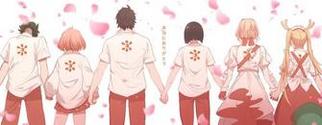 |
Jul 18, 2019 6:24 AM
#8
| [quote=Short_Circut message=57984156] the atmosphere in the show was made perhaps even more mature than it was in the original manga or novel. That a bold statement, they skipped some comedy but butchered the Quenn and changed Raphtalia. Overall I would say it remained the same. |
More topics from this board
» 'Fairy Tail: 100 Years Quest' Announces Additional CastDatRandomDude - Apr 30 |
4 |
by DGarsh
»»
42 minutes ago |
|
» 'Hazurewaku no "Joutai Ijou Skill" de Saikyou ni Natta Ore ga Subete wo Juurin suru made' Announces Additional Cast, Ending ThemeDatRandomDude - Yesterday |
2 |
by Tropisch
»»
7 hours ago |
|
» Manga 'Hanazakari no Kimitachi e' Gets AnimeDatRandomDude - May 14 |
41 |
by NEMA
»»
10 hours ago |
|
» 'Zatsu Tabi: That's Journey' Reveals Main Cast, Staff, Teaser Promo for 2025Hyperion_PS - May 15 |
3 |
by Berry-Vodka
»»
11 hours ago |
|
» 'Diamond no Ace: Act II' TV Anime Sequel in ProductionVindstot - May 18 |
19 |
by malvarez1
»»
Yesterday, 12:31 PM |
